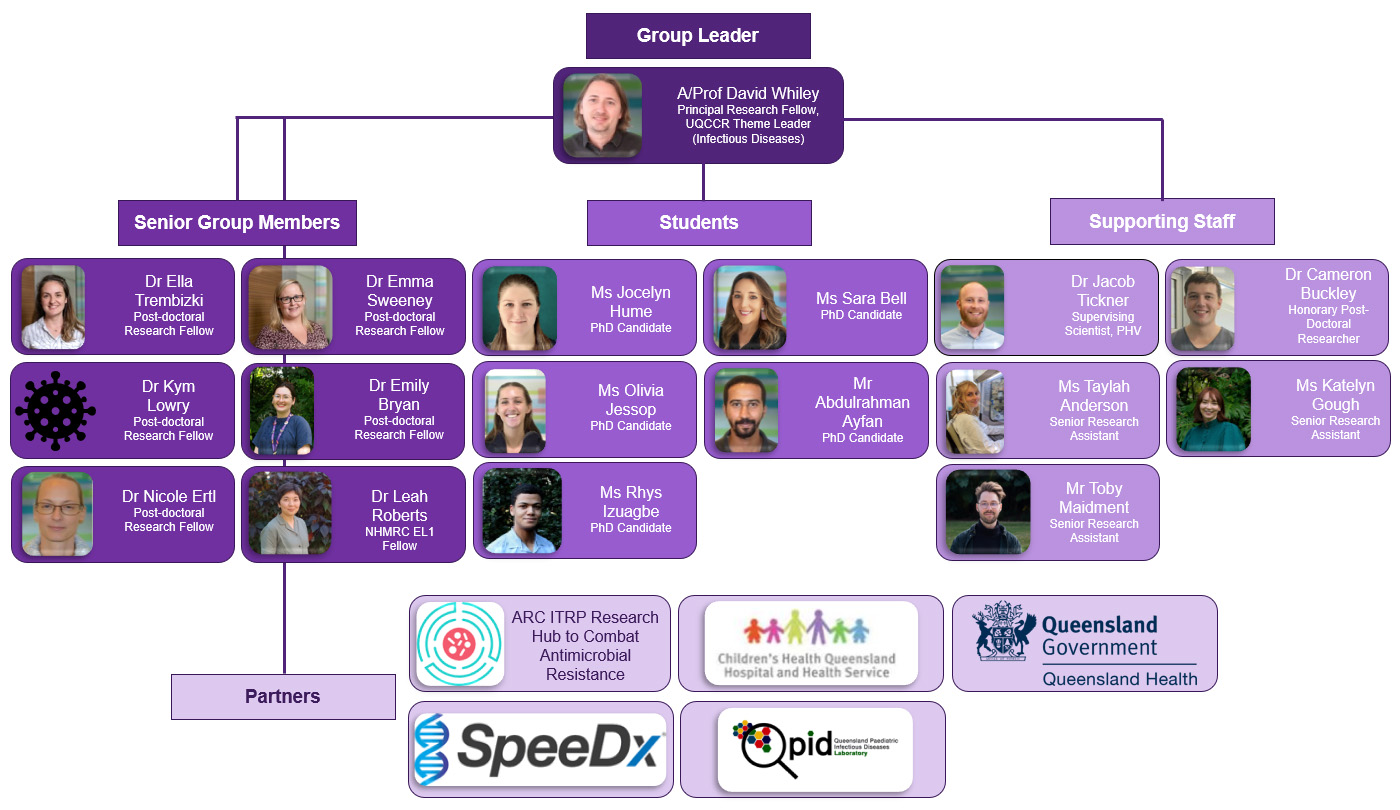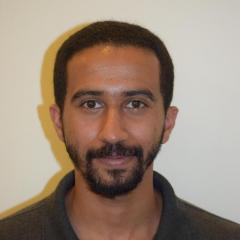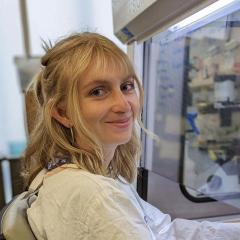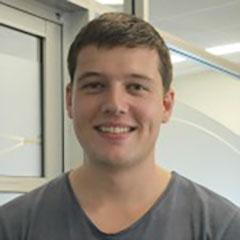About
Associate Professor David Whiley manages the Microbial Diagnostics and Characterisation Lab, which is a joint initiative of Pathology Queensland and The University of Queensland’s Centre for Clinical Research (UQCCR). This Lab focuses on enhancing the capacity of clinical laboratories to diagnose, identify, and characterise bacteria and viruses, with an emphasis on paediatric, respiratory, and sexually transmitted infections.
The Lab’s priority research area is antimicrobial-resistance, with the aim to improve antibiotic-resistance surveillance in areas where current surveillance activities are limited. We currently hold an Australian Research Council ITRP Research Hub on this topic, encompassing gonorrhoea, mycoplasma, CMV, and more.
We are currently recruiting Honours, Masters, and PhD students to work on many of the exciting and cutting-edge projects listed under the Research Projects tab, below. Any enthusiastic, research-minded students can email our Senior Group Members or Group Leader for more information.

- The high quality of Dr Emily Bryan’s publication developing a novel mouse model of gonorrhoea was recognised by winning UQCCR Publication of the Month
- In 2023, Dr Emma Sweeney won the UQ Partners in Translational Research Excellence award for her important work with our partners SpeeDx.
- Dr Emma Sweeney and Dr Jacob Tickner won the UQ Early and Mid-Career Researcher Industry Engagement award with our partners SpeeDx in 2023.
- Dr Emily Bryan won the 2023 UQCCR Early-Career Researcher of the Year.
- Our group leader, Associate Professor David Whiley won the 2023 UQCCR Award for Outstanding Contribution.
- In 2023, Dr Jacob Tickner won both the People’s Choice and Runner-up awards at the UQ Faculty of Medicine Research and Innovation Showcase.
- Dr Jacob Tickner’s high quality publication on gonorrhoeae antimicrobial resistance was recognised with a Publication of the Month award.
- Our PhD student, Olivia Jessop, was a Faculty of Medicine 3MT Finalist in 2023, and her exciting work on gonorrhoea also won a poster prize at the UQCCR 15 year anniversary showcase.
- Group Member, Dr Emily Bryan, was a 2023 Finalist for the Queensland Women in Stem Prize.
- Whiley Group members received a high commendation for their work on DMTC-led rapid diagnostic technology at Land Forces 2022.
- In 2022, Dr Kym Lowry was awarded Paper of the Year at Queensland Paediatric Infectious Diseases Research Group Symposium
- UQCCR Publication of the Month Winners highlight the excellent quality of our outputs:
- Senior group member, Dr Emma Sweeney, speaks about our important work on Mycoplasma genitalium on the BMJ STI Transmitted Infections podcast. Listen to it now.
- Group member, Dr Kym Lowry, speaks about her virus evolution and transmission research.
- In 2021, Dr Kym Lowry won Best EMCR Presentation at Centre for Children’s Health Research EMCR 2021 Research Symposium.
- Dr Kym Lowry was awarded Best presentation (2021) at Queensland Paediatric Infectious Diseases Research Group Symposium.
- Establishing novel Neisseria laboratory models using Neisseria musculi
- Understanding the burden of disease of respiratory syncytial virus in the Queensland adult population
- Identifying novel and discriminatory markers for invasive Aspergillus fumigatus infection for diagnostic application in immunocompromised patients
- Development, evaluation and validation of Mycoplasma genitalium antimicrobial resistance diagnostics
- Novel approaches for the detection and characterisation of Mycoplasma genitalium
- Strategies for enrichment and sequencing of Mycoplasma genitalium
- Isothermal detection methods for antimicrobial resistant STIs
- Molecular characterisation of syphilis in Queensland
- Enhanced molecular diagnostics for cytomegalovirus and antiviral resistance
- Enhanced diagnosis and management of active human herpesvirus-6 infections in immunocompromised children
- Neisseria gonorrhoeae molecular resistance targets: generating evidence to inform gonorrhoea management strategies
- Rapid whole genome sequencing for SARS-CoV-2 infections
- Using genetic surveillance to understand the disrupted seasonality of paediatric respiratory viruses despite physical distancing
- Development of wastewater-based epidemiology as a complementary approach for infectious disease surveillance
- Epidemiological surveillance of Neisseria gonorrhoeae AMR in Indonesia
- Prevalence of ocular Chlamydia trachomatis infection and anti-Pgp3 antibodies in Nauru and Choiseul
- Epidemiological surveillance of Neisseria gonorrhoeae AMR in Fiji
Australian
- Dr Brian Forde, The University of Queensland
- Dr Krispin Hajkowicz, The University of Queensland
- Dr Michael Hall, The University of Queensland
- Dr Chris Howard, The University of Queensland
- Dr Jocelyn Hume, The University of Queensland
- Dr Leah Roberts, The University of Queensland
- Professor Amy Jennison, Queensland Health
- Professor Stephen Lambert, Queensland Government
- Professor Robert Ware, Menzies Health Institute Queensland, Griffith University
- Professor Monica Lahra, World Health Organisation Collaborating Centre for STI and AMR, New South Wales Health Pathology
- Associate Professor Lucia Romani, Kirby Institute, UNSW
- Professor Susan Vas Nery, Kirby Institute, UNSW
- Scientia Professor John Kaldor, Kirby Institute, UNSW
- Dr Patrick Harris, UQ Centre for Clinical Research
- Dr Gerald Murray, Obstetrics and Gynaecology Royal Women's Hospital/Mercy, The University of Melbourne
- Professor Catriona Bradshaw, Melbourne Sexual Health Centre, School of Translational Medicine, Monash University and Alfred Hospital
International
- Associate Professor Katherine Rhodes, University of Arizona, USA
- Professor Andreas Meinhardt, Justus Liebig University Giessen, Germany
- Professor Hans-Christian Schuppe, Justus Liebig University Giessen, Germany
- Dr Daniela Fietz, Justus Liebig University Giessen, Germany
Current
- 2026 - GSK: An Observational Study of the Epidemiology, Burden of Disease and Genomics of Respiratory Syncytial Virus Infection in Adults aged Sixty and Older Living in Queensland, Australia.
- 2025 - Children’s Hospital Foundation: Enhanced diagnosis and management of active human herpesvirus-6 infections in immunocompromised children
- 2025 - Australian Research Council: ARC ITRP Research Hub to Combat Antimicrobial Resistance
- 2024 - Bill and Melinda Gates Foundation: To increase accessibility of affordable gonorrhoea with antimicrobial susceptibility/resistance testing, particularly in low-resource settings to empower individuals, and lower healthcare costs and antimicrobial resistance.
- 2023 - HeIDI and CSIRO IDR and AMR Mission Affiliated Projects: Development of Wastewater-based epidemiology as a complementary approach for infectious disease surveillance
Recently completed
- 2023 - UQ/Australian Infectious Diseases Research Centre Basic-Clinical Seed Funding: Identifying novel and discriminatory markers for invasive Aspergillus fumigatus infection for diagnostic application in immunocompromised patients
- 2023 - UQ/Australian Infectious Diseases Research Centre Basic-Clinical Seed Funding: Development of a prototype isothermal detection method for ceftriaxone-resistant gonorrhoea
- 2023 - SpeeDx: REDI Fellowship on development of diagnostics for Mycoplasma genitalium
- 2023 - Children’s Hospital Foundation: The development of an integrated molecular diagnostic pathway to optimise the treatment of cytomegalovirus in children undergoing haematopoietic stem cell transplant
- 2022 - FSS Research and Development Grant
- 2022 - Sexual Health Research Fund: Expanded gonorrhoea screening to inform guidelines for asymptomatic heterosexual women and men
- 2022 - UQ Seed Funding: Exploring the association between oral HPV and pharyngeal STIs (QIMR collaboration)
- 2022 - Australian Society for HIV, Viral Hepatitis and Sexual Health Medicine: Precision public health for enhanced syphilis management in Queensland
- 2022 - DMTC: Refining a molecular genetics platform for rapid and accurate point-of-care detection of pathogens
- 2022 - SpeeDx: ResistancePlus MABSC/MAC test for detection of MABSC, MAC and gene markers associated with susceptibility or resistance to macrolides and amikacin antibiotics
- 2022 - Pathology Queensland Study, Education & Research Trust Fund: Rapid Whole Genome Sequencing Protocols for SARS-CoV-2 Infections
- 2021 - Children’s Hospital Foundation: Enhancing detectioin and management of Mycobacterium abscessus complex (MABSC) infection in children with cystic fibrosis
- 2020 - Children’s Hospital Foundation: Rapid point-of-care tests for multidrug resistant superbugs
- 2020 - UQ Early Career Project-Support Grant: Preparing for the worst: novel rapid diagnostics for extensively drug resistant (XDR) Salmonella in high and low resource settings
- 2020 - Pathology Queensland Study, Education & Research Trust Fund: Enhanced diagnostic testing for Mycoplasma genitalium antibiotic resistance
















